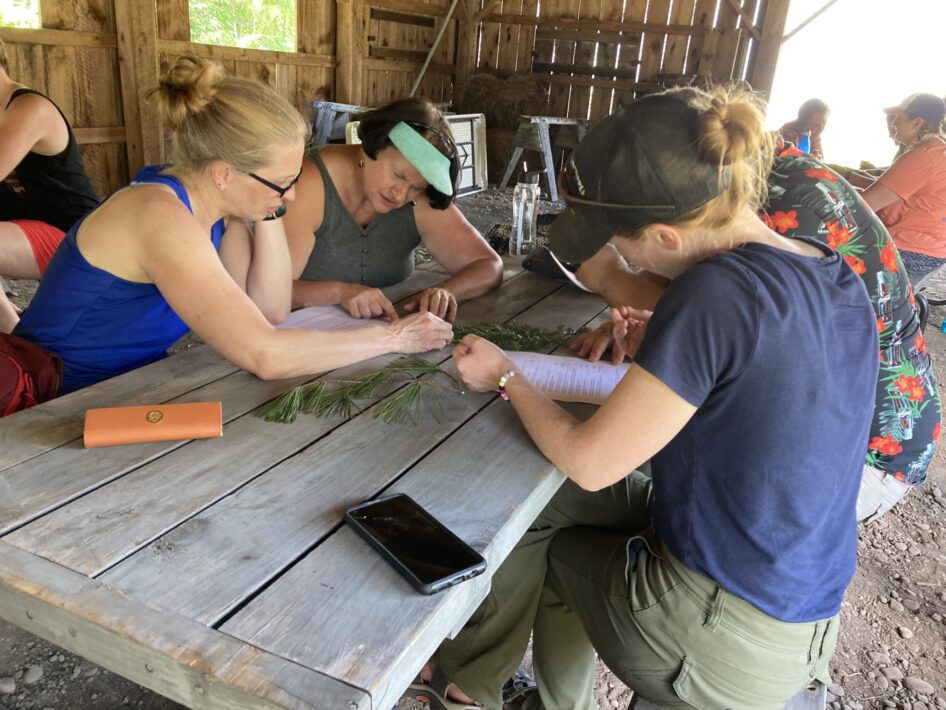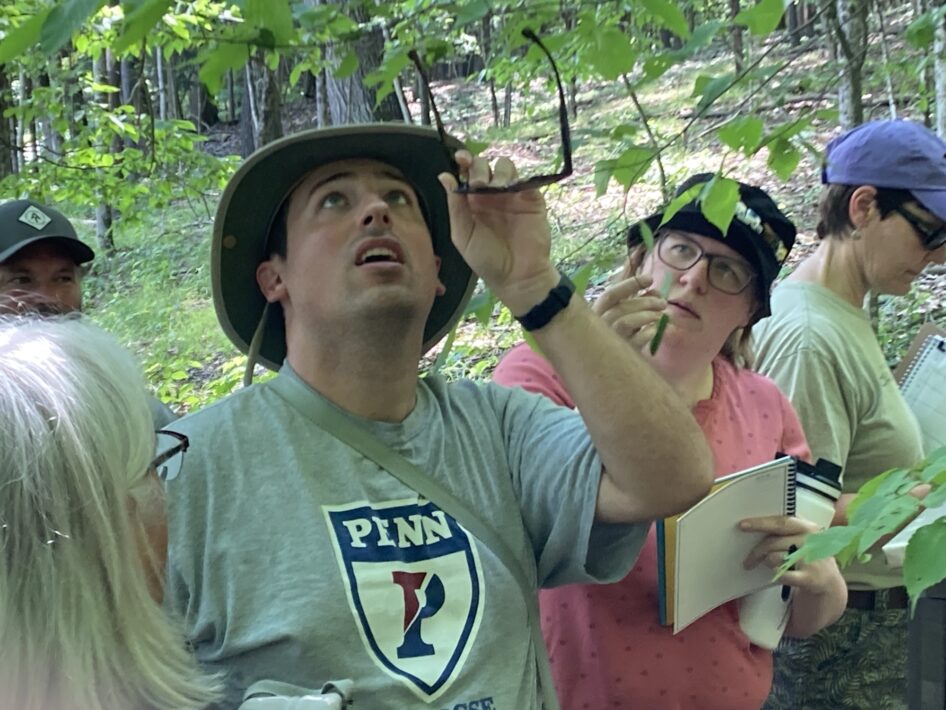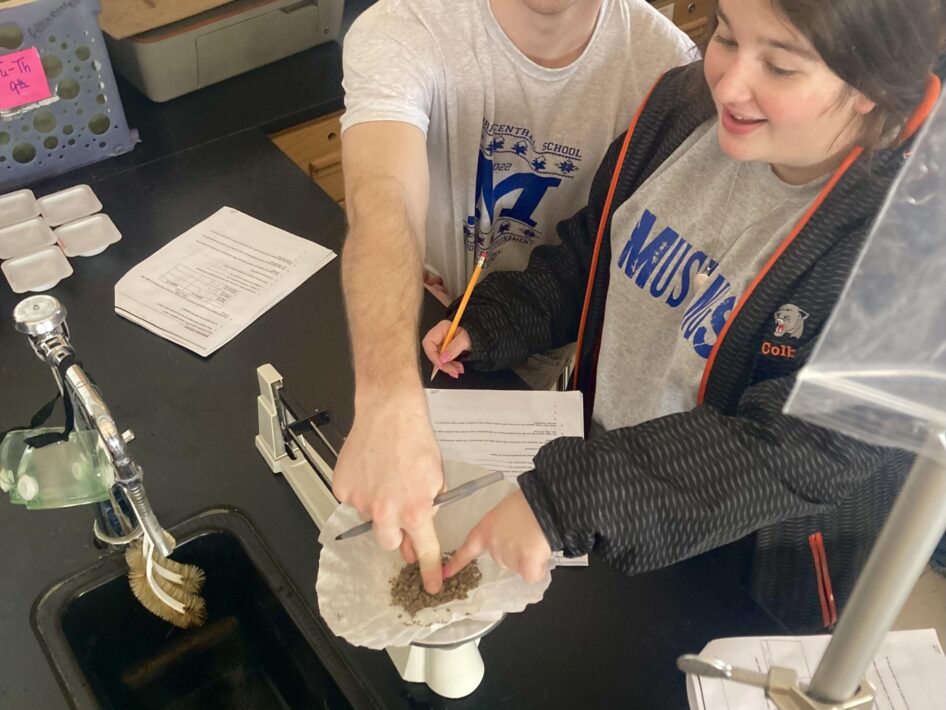MWEEs Take Root in New York State Schools

by Heather Grant, Morris Central School Teacher and Curriculum Specialist for the Upper Susquehanna Watershed Project; and Jeff O’Handley, Program Director for Otsego County Conservation Association
Planting Seeds of Environmental Literacy
Otsego County Conservation Association (OCCA) started the Chesapeake Bay Headwaters Educational Ecosystem program in 2021, funded with a NOAA B-WET capacity building grant. The program was specifically designed to provide teachers with the tools needed to develop, integrate, and implement Meaningful Watershed Educational Experiences (MWEEs) in their classrooms. The original plan called for a five-day, in-person professional development, followed by ongoing support in the form of monthly check-ins/mini-professional development using online conferencing software. The goal was to work with teachers across the 180-mile wide breadth of the New York portion of the Chesapeake Bay watershed.
Of course, COVID had other ideas, so the professional development opportunity was adapted into a hybrid institute. Teachers learned about the MWEE framework and the Environmental Literacy Model, connected with content experts and curriculum specialists, and gained techniques for conducting field investigations. The institute also provided time for networking, forming partnerships, and planning their own MWEEs. Afterward, participants received ongoing support through regular online check-ins and content workshops with OCCA staff.
These programs were offered again in the summer of 2022 and 2023 entirely in-person, building a network of 37 teachers across 27 school districts in the New York State portion of the Chesapeake Bay watershed. Multiple one-day workshops were also offered through local professional development days and the New York State Master Teacher Program.

Growing MWEEs: OCCA provides Classroom Support and Professional Development
Building on the success of the first partnership, OCCA teamed up with two local districts, Morris Central School and Milford Central School, to build more in-depth MWEE programs over two years. In these programs, students ranging from middle school through college-level biology courses participate in in-depth MWEEs, investigating their local watersheds using hands-on exploration. The technical support from OCCA has been instrumental in guiding schools through the MWEE process, offering support in fieldwork, lesson development, and equipping educators and students with the tools and training necessary for meaningful environmental investigations.
Outdoor Investigations
OCCA provides direct assistance in organizing and conducting hands-on environmental investigations, ensuring students have access to real-world scientific practices. This includes:
Supplying specialized equipment for environmental studies, such as water testing kits, nets for macroinvertebrate collection, and tools for vegetation sampling.
- Offering training for educators and students on key field techniques, including:
- Vegetation Sampling: Teaching methods to assess plant biodiversity and monitor the health of riparian buffer zones.
- Stream Chemistry: Guiding students through the process of measuring pH, dissolved oxygen, and other indicators of water quality.
- Macroinvertebrate Studies: Identifying aquatic insects and other organisms as indicators of stream health.
- Invasive Species Monitoring: Providing strategies to identify and track non-native species threatening local ecosystems.

Connecting with Local Projects
MWEEs don’t need to start from scratch with a novel local environmental issue. Working with local organizations and connecting to ongoing or established projects can be a great way to introduce students to experts and help ensure the sustainability of their action project.
Morris Central School students have had the opportunity to collaborate one-on-one with environmental organizations such as the Upper Susquehanna Coalition and the Susquehanna Basin River Coalition on the Butternut Creek remediation project. The creek runs adjacent to school property. The project has allowed students to experience stream chemistry and macroinvertebrate monitoring first hand, both before and after the remediation project, and participate in planting riparian buffers along the creek.
Morris students have also worked with OCCA specialists in surveying and monitoring invasive species adjacent to the bus garage construction site on school property. Students annually survey the buffer zone along a tributary to the Butternut Creek and pull invasives during the “Morris Central School Invasive Species Day.” Students from all classes and grade levels are invited to join OCCA and Morris Biology classes as they learn to identify and remove invasives in the area.
Lesson Development
OCCA collaborates closely with teachers to build lessons aligned with New York State Science Standards and MWEE principles. Educators receive ongoing professional development, enhancing their ability to integrate environmental literacy into the curriculum. OCCA’s free online MWEE courses further expands access to these valuable resources, empowering teachers from across the state — and beyond — to bring these lessons to life in their own classrooms.
The Power of Environmental Literacy Plans
The Otsego County Conservation Association (OCCA) is working with Morris Central School and Milford Central School to develop Environmental Literacy Plans (ELPs). These sustainable, long-term plans will embed environmental education into their curricula while aligning with New York State Science Standards and the principles of Meaningful Watershed Educational Experiences (MWEEs).
“We hope to see more schools develop Environmental Literacy Plans and integrate MWEEs into their curriculum, as we work to build a strong foundation for the next generation of environmental stewards.”
- Jeff O’Handley, OCCA Program Director
These plans will not only support academic standards but also enhance students’ critical thinking and problem-solving skills while deepening their connection to the natural world by scaffolding environmental education experiences across all grade levels. OCCA envisions these districts to serve as models for environmental literacy, inspiring other schools across the state to follow suit.
Cultivating the Next Generation of Environmental Stewards
OCCA is working with local teachers to make MWEEs a lasting part of environmental education in New York schools. By giving educators the resources, training, and support they need, students are able to move beyond the textbook and into real-world, hands-on learning that connects them to their local environment. “With continued professional development, accessible resources, and growing school-community partnerships, we’re excited to see this work expand—ensuring that students don’t just learn about the environment, but actively engage with it to make a real difference,” says Jeff O’Handley, Program Director for OCCA when asked about the long-term goals for their environmental literacy efforts.
